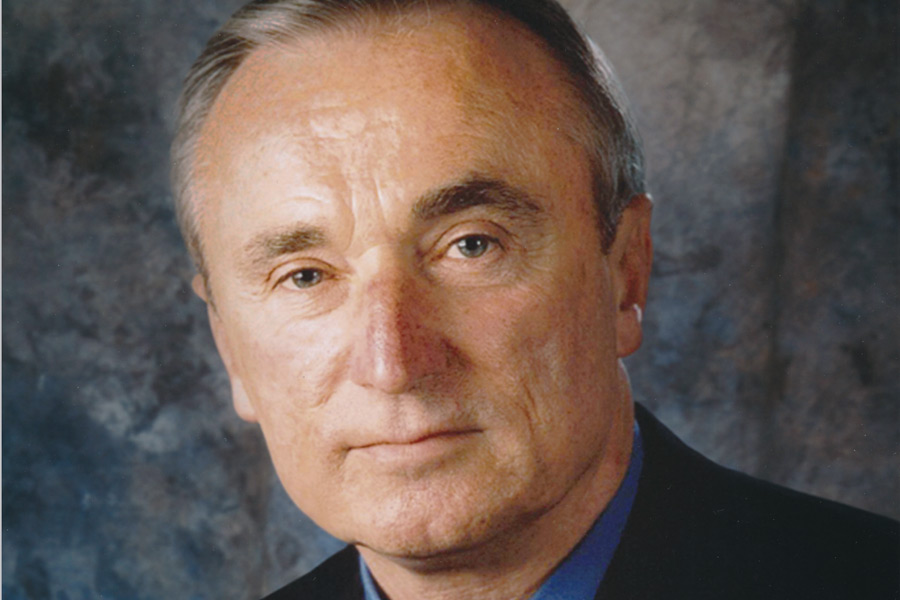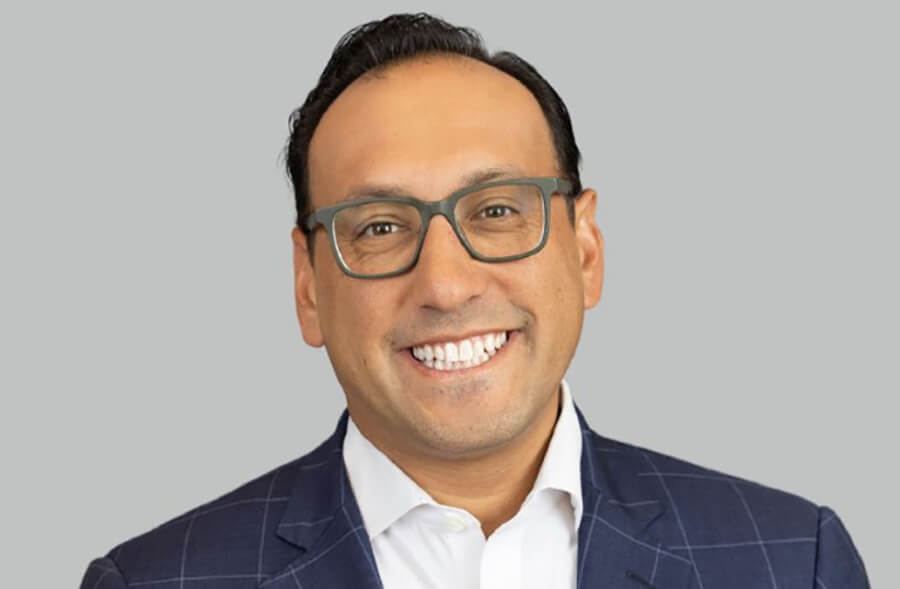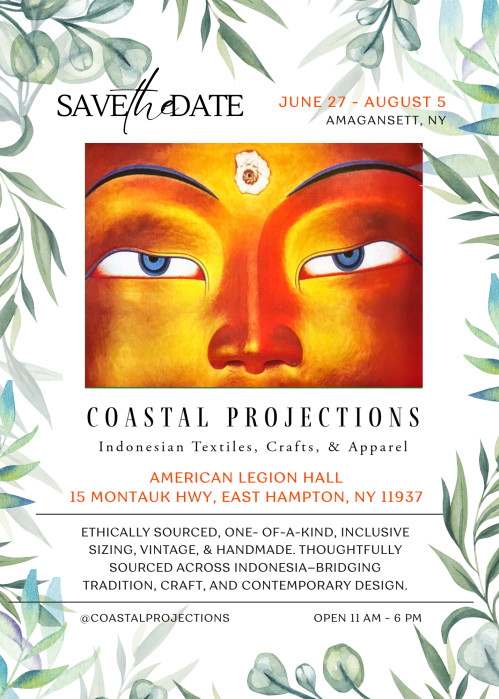Who's Here: Bill Bratton, NYC Police Commissioner

The office of the Police Commissioner of the City of New York is a grand space on the 14th floor of the massive 1 Police Plaza building across from New York City Hall in lower Manhattan, and it is filled with the memorabilia of police commissioners past and present. The current commissioner, Bill Bratton, who with his wife, Rikki Klieman, has a vacation home in Hampton Bays, invited me there for this interview, and had a special unit ease my way through the heavy security procedures you would expect on the ground floor of such a building.
Commissioner Bratton proudly showed me around his office. His desk, a grand affair, was built for Teddy Roosevelt when he was commissioner about 120 years ago. The Commissioner’s Shield, made of gold and platinum, is by Tiffany.
“It’s pretty priceless,” he said.
There’s a collection of police helmets from years gone by, which Bratton personally has collected. Currently on display atop a bookcase were ten British police bobbie helmets from different forces. And there is the collection of badges worn by Bill himself over the years during his long police career, including his first patrolman’s badge from the Boston police force. He took it out and showed it to me. It said PATROLMAN on it.
“There were no women on the force in 1970 when I started,” he said. There are vestiges of that long-ago time today. For example, the union is still the “patrolmen’s union.”
The London bobbie hats were of interest to me. “I’ve always wondered why the English policemen don’t carry guns,” I said.
“It’s from when the police force was first formed in the early 19th century,” Bratton told me. “There was opposition to the whole idea of a police force, and the public would only allow it to be formed if the bobbies were not allowed to carry firearms. They could carry truncheons. They had whistles. In any case, there were not many pistols back then, anyway. And even to this day they don’t routinely carry firearms.”
“I read these old British detective murder mysteries,” I said. “And the police confront the perpetrator with the evidence, and the perpetrator says, ‘Well, you got me.’ No guns necessary.”
“America is the Wild West from the English perspective,” Bratton said. I named my favorite British mystery author, Dorothy L. Sayer, and recommended her. He then suggested I read the novels of Donna Leon, an American ex-pat living in Venice. The hero is the chief inspector of the Venice police force. Bratton is an ongoing student of police force history everywhere. And he always has been.
There’s a famous story in his family that one winter day when he was one-and-a-half and living in Dorchester, Massachusetts with his parents, his mother suddenly lost track of where he was, panicked, but then heard horns honking out in the street—and there he was in his snowsuit, directing traffic.
Bratton is not a native New Yorker. Dorchester was a blue-collar section of Boston, and his mother was a housewife and his father a mailman who also worked a second job in a foundry, chroming steel.
“When did you decide you wanted to be a policeman?” I asked.
“When I was a little boy. It’s all I ever wanted to be.”
“Were there others in your family who were policemen?”
“Nope. I was the first. I’d watch the TV programs about police work. TV was black-and-white then. My favorites were Dragnet and Naked City.”
Bratton knew, at age 19, that to be a policeman on the Boston police force, you had to be at least 21. What would he do with those three years? He’d finished high school. The Vietnam War was heating up. Maybe he could enlist in the Army and join the Army Police. He could be an MP. But they trained him to work as an MP with police dogs. Nothing he could do about it. They sent him and his dog to Vietnam, and they saw brief combat during the Tet Offensive. Within a year of returning home, he joined the Boston police force in 1970.
As you hear him tell it, you realize that everything he did in those years, and actually ever since, whether at school or in the Army or in the police force, was preparation for taking a leadership position. It came naturally to him. And either because of that or because he was imaginative, he developed approaches to the job at hand that would result in his standing out, and with the success to prove it.
“Ten years in as a police officer, in 1980, I was promoted to be Superintendent in Chief, second in command in Boston. I was the youngest person ever to achieve this rank, at age 32. I got noticed because I had created an experimental neighborhood policing program for one of our precincts. I thought we could do better if policemen were assigned to the neighborhoods consistently as much as possible. They could keep up with goings on. That was prevention. Then I brought in the new 911 emergency call system, which was new at that time. That was ‘rapid response,’ which was handled by a different group of officers.”
He was also a highly decorated officer. He had gotten the department’s top award for valor for facing down a bank robber and rescuing a hostage while a foot patrolman.
In 1983, Bratton was named Chief of the Massachusetts Bay Transit Police, and three years after that, he became Superintendent of the Massachusetts Metropolitan District Commission Police Department.
Based on his performance there, he was asked in 1990 to be the head of the New York City Transit Authority.
“Anyone who lived in New York City in the 1970s and 1980s will remember the high crime rate everywhere in the city. Muggings were frequent,” he says. “People were afraid to go outside. And here I was assigned to run the subway police, where, if anything, crime seemed worse than above ground, though that was not the reality.”
But Bratton had noticed that in the subway, unlike on the streets, crime was largely petty. Fare jumpers. Pickpockets. Graffiti vandals. Purse snatchers. He became interested in a theory called “the broken window theory” of police protection. If broken windows remain broken, crooks are encouraged to do more. But if windows are broken and arrests quickly follow, it sends the opposite message. The theory was based on a 1982 Atlantic Monthly article titled “Broken Windows” by James Wilson and George Kelling.
But to do that, he needed a well-knit force with high morals and a direction. Bratton put together teams of associates who espoused pride, honesty, courage, courtesy and professional back-up. There was an agenda and there was a goal. And all headed toward it. Bratton basically favors careful, aggressive enforcement, teamwork, courteousness to the citizenry and crime prevention, or as he puts it, policing that is “constitutional, respectful and consistently applied.”
“For the subway,” he told me, “I directed our officers to arrest turnstile jumpers,” Bratton said. “This was a matter of a dollar and 50 cents at the time. But there were 250,000 fare jumpers that year. This was a visible crime. We arrested as many as we could. What we found was that 1 out of 7 fare jumpers were wanted on warrants for other crime. We also found that 1 out of 20 carried a knife, a gun or other weapon. The word went around. We had said the subways would be safer. And they were safer. Subway crime dropped 30% the year after I put this into effect.”
The following year, however, in 1992, Bratton was offered the job of Boston Police Commissioner, and he took it. Truth was, he had always wanted that job. Indeed, in years past, while second in command he had told a reporter that his goal was to be Commissioner, and when that got to the Boston Commissioner, he was transferred to a lesser position.
But his time as Boston Police Commissioner was short-lived. The following year, New York’s new mayor, Rudolph Giuliani called him in Boston and asked if he could do the same thing on the streets of New York as he had done in the subways. He said he could. He said he could make crime drop 40 percent in three years if he were Commissioner. Keep in mind, crime had begun to go down in New York, but not enough that anybody noticed.
And so it was that Bratton returned to New York to attack crime and disorder in the city. Before he took office, he held a press conference at which he said, “We will fight for every house, every street and every neighborhood, and we will WIN.”
Everybody knows you don’t “win” against crime. But Bratton did.
Bratton brought many new tools to crime-fighting in the city. He used charts to locate high-crime areas, and then he started CompStat, a computer system that not only did that automatically but also created a police accountability system down to the precinct level. This meant giving decision-making responsibilities to the precinct captains. There were now police on the streets where they needed to be.
He went after visible street crime so he could show a quality-of-life improvement to the general public immediately. He needed the public unafraid. And he achieved that. These were remarkable things he did.
“We went after street narcotics in 8,000 locations,” he told me. “We went after prostitution, we got rid of the squeegee guys and we got the homeless off the streets. Visible crime dropped. You could see it drop.”
In his first year in office, crime dropped by figures in double digits in all 75 precincts in the City of New York. By 1996, crime in the city had dropped by nearly 40 percent.
By that time, however, with Bratton’s programs in place, he had left New York City because of disagreements he famously had with Mayor Giuliani. It seemed there was not room in this city for two big leaders. One had to go. And it would not be the Mayor. But Bratton’s work was now known nationwide. After six years working successfully in the private sector, he returned to his first love—policing—in 2002 as Chief of Police of the City of Los Angeles, a city whose police were seemingly at war with the Latin and African-American communities. Bratton is the only police official ever to head the police departments in the two largest cities in the United States.
Crime in Los Angeles in those years was so bad, it was almost a war zone. The LAPD relationship with the city’s minority communities was so bad that a federal monitor had been installed to be a watchdog over the department.
“How was that for you?” I asked.
“It was a good thing for Los Angeles. My main goal was to improve relations between the police department and the general public, particularly the minority groups. If they were with you—and my wife, Rikki, helped me with outreach to these communities—I knew I could create a powerful and effective police force to carry this forward. We could succeed. And we did.”
Bratton was the first police chief to be asked to serve a second term in Los Angeles in 30 years. And he was to remain there for seven years, until 2009.
Bratton is very proud of the fact that in 2009, as he prepared to leave, the Los Angeles Times wrote that after years and years of outreach by their police chief into the Latino and African-American communities in that city, “finally a corner had been turned in race relations.”
Many think that Bratton is one of the three or four greatest police chiefs in America in the last hundred years.
Bratton is happily married to Klieman, a former prosecutor and criminal defense attorney and currently legal analyst for CBS and CBS This Morning, who is frequently at his side at police and community events.
“She has brought a tremendous amount of energy and commitment to this work,” he said. She also is an active board member of the Police Athletic League, working with the city’s youth.
Bratton and Klieman married in 1999. Both had been coming to the Hamptons. Indeed, at that time, they owned a house in Quogue. But that house got sold.
“When we moved to Los Angeles,” Bratton said, “we had to sell that house to buy one out there.”
“What first brought you to the Hamptons?” I asked.
“I was a houseguest of Dr. Richard Winter in 1991. He was an honorary police surgeon, and he had invited me out to his house in Flying Point. I had no real concept of what the Hamptons was all about until I came out that weekend. All the amenities here, it just bowled me over.”
Today, the Brattons are here almost every weekend year-round. But they are not stay-at-homes. They are out and about and they have a routine.
“We first know we have arrived in the Hamptons when we pick up a copy of your paper in Manorville at the Mobil gas station at Exit 70. The second marker is the giant sculpture, Stargazer, where Manorville Road meets the Sunrise. We are here!”
They leave the city early on Saturday and have breakfast at Estia’s in Sag Harbor. Sunday morning, breakfast is at the Hampton Maid in Hampton Bays. They enjoy Sip’n Soda and Silver’s for lunch in Southampton, and they often take treks out along the North Fork.
“A favorite of ours anytime is the Stone Creek Inn in East Quogue. We also enjoy the live theater performances at the Quogue Meeting House by the Hampton Theatre Company. We shop at the Quogue market, we work out at the sports club in Quogue and grab sandwiches at Sonny’s in East Quogue. These are some of the places that have become part of our routines.”
Before I left, we had a conversation about “Stop-and-Frisk” in New York City, which the new mayor, Bill de Blasio, who hired Bratton, has said he will cut back.
“This is now a non-issue,” Bratton said. “The decline in stop-and-frisk incidents was dramatically put into place before I became Commissioner and before de Blasio became Mayor.
From a high of almost 700,000 stops in 2011, they have continued to decline steadily throughout the city. “And crime continued to go down, and still is going down.”
(In 1990, there were 2242 murders in New York City. During the first four months of 2014, there were 89. Murder in New York City in 2003 was less than 20% of what it was when Bratton first put his team in place in 1993.)
“Truth is, stop-and-frisk is just one tool. It was an effective tool, but its not needed in such great numbers anymore. The proof is we’ve dramatically reduced it and crime continues downward. We have many more tools, new ones, to prevent crime and make arrests when necessary.”
“What are they?”
“We have DNA, camera systems, better visibility, better forensics and a better, more confident and effective police force. We also have the respect of our citizenry. They know we protect them.”
And it all started with a belief that the police could do something about crime. Bratton’s mantra is “Cops count, police matters.”









